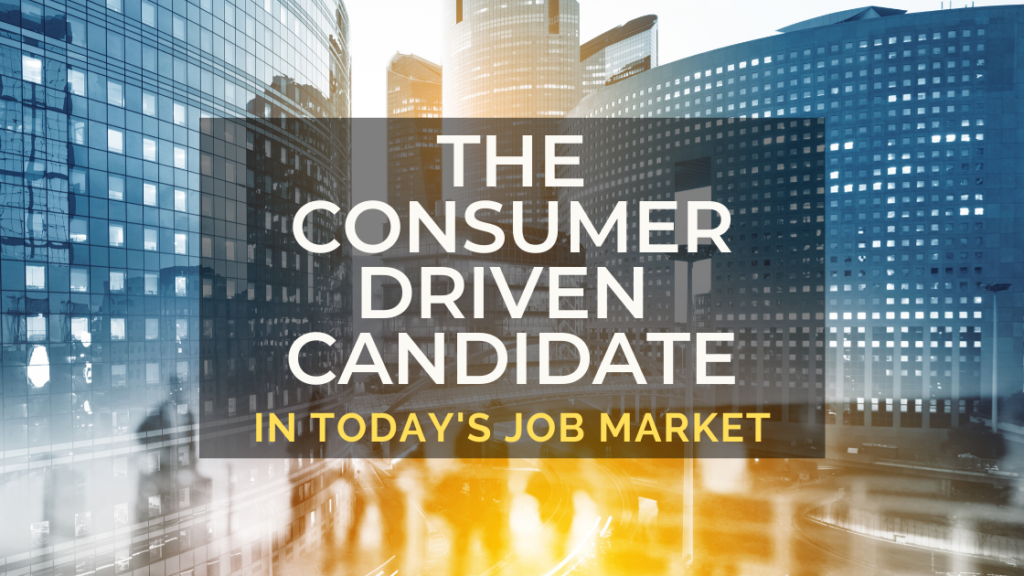
The Consumer-Driven Candidate
Recruiting in 2008 was heartbreaking.
I can remember receiving resumes from just about everyone in the home-building or mortgage-lending business. The housing market came to a literal standstill.
Candidates applied to jobs outside of their scope just to feed their families. Of course, finding work in other fields was challenging as well.
In that recession year, there were over two million laid off from their jobs. For those of us in talent acquisition, we realized we had the upper hand and became discerning in our callbacks.
Overall, it was an employer’s market, and we sat high on our perch. Of course, time changes all things. We have enjoyed times of plenty since then, times that are now over. It is deja-vu all over again in the form of a COVID-19.
The 2020 Market
In 2020 the employer market was replaced with a candidate-driven market. Unemployment is the lowest it has been in fifty years. Or was, before COVID-19 appeared. Now, a record 3.5 million people have filed for unemployment due to the pandemic.
Despite this recent turn of events, the highly skilled candidate population still expects a certain level of treatment. Think of a Respiratory Therapist. They can have any job on the planet right now. Even if you don’t have highly specialized skills that can be used in a pandemic, the highly qualified individual in any field holds the cards.
Technology has driven up the need for specialized talent. The top 25% of candidates in any market, any industry, still have choices when it comes to job opportunities, and they know it.
Along with this candidate-driven market comes a change in the candidate state of mind. Candidates still expect the white glove treatment, even if they are casually looking, experiencing layoff, or under-qualified.
Candidates expect to be listened to and responded to promptly. They will read our company reviews. They will check out company social media sites. And then they will make determinations in brand choices just as they would purchasing a product.
The Candidate Life-cycle
As talent acquisition professionals, we need to adapt to this new outlook. The consumer-driven candidate state of mind is here, and we need to change our mental workflow processes to meet this consumerism ideal.
There is a reason we return to the same mechanic, car dealership, salon, or barber. We like how it feels to be remembered and known by name. We value that someone knows our preferences.
Candidates feel the same way. They want to be known and for their talent professional to remember their dream job and salary. Consumer-driven candidates will follow a life-cycle just like a consumer does.
This lifecycle begins with an awareness of your brand, building opinions about your company, consideration as a preference to apply online, and ends with a purchase or, as we call it, a hire. Recognizing the lifecycle and focusing on candidate delight is the key in all future pipeline hires.
Product marketers don’t expect to sell a consumer on the first pitch, and neither should we as talent pros. Devotion to a brand happens over time.
Working with consumer-driven candidates requires a small investment of understanding. Although technology and tools are a great addition to a talent acquisition toolbox, the real value is in understanding the consumer life cycle and mindset.
Characteristics of a consumer-driven candidate are noted below with best practices in meeting the high consumer expectations.
Traits of a Consumer-Driven candidate:
First, they value research.
Accept that the candidate will probably view your Glassdoor page. Have a few key points already prepared to address, even if the candidate doesn’t bring it up. It is an offensive approach and requires talent acquisition to accept that we are no longer in charge of our own stories. If our stories are skewed, we need to acknowledge the scars as the consumer-driven candidate also values transparency.
Second, they expect treatment like a customer.
When I am window shopping, I expect a shopkeeper to treat me with respect and dignity. Even if I clearly can’t afford their wares.
Similarly, an under-qualified new graduate-level candidate today is an experienced hire in four years. It’s a long game. Surprisingly, the most extended time frame I had between communications with a candidate was twelve years. Above all, they remembered how I made them feel, and they keep coming back for more.
In agency work, it isn’t unusual for a candidate to stay with the same recruiter over the life of their career. Corporate recruiters and sourcers can learn from this. The only difference is how each party viewed the relationship.
Third, once they choose a brand, it’s hard to change their mind.
If you don’t believe me, try to get an Apple iPhone user to change to Android. Yeah, good luck with that.
In closing, we may only get one chance as talent professionals to impress a consumer-driven candidate. Don’t blow it.
Authors
Christine Hampton
Christine is a Doctor of Business Administration candidate researching talent sourcing strategies in healthcare. This is Christine's 29th year in Talent Acquisition, with the last 9 years focusing on sourcing and recruitment marketing.
Recruit Smarter
Weekly news and industry insights delivered straight to your inbox.





